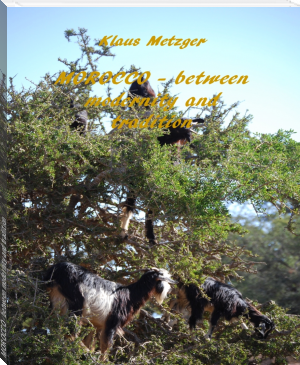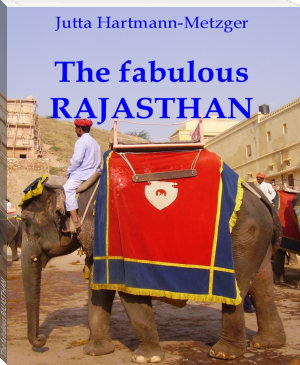Experiences with ARAB Countries by Klaus Metzger, Jutta Hartmann-Metzger (little red riding hood ebook free txt) 📕

Read free book «Experiences with ARAB Countries by Klaus Metzger, Jutta Hartmann-Metzger (little red riding hood ebook free txt) 📕» - read online or download for free at americanlibrarybooks.com
- Author: Klaus Metzger, Jutta Hartmann-Metzger
Read book online «Experiences with ARAB Countries by Klaus Metzger, Jutta Hartmann-Metzger (little red riding hood ebook free txt) 📕». Author - Klaus Metzger, Jutta Hartmann-Metzger
The Goldland PUNT in antiquity
An interesting cross-link is the Goldland PUNT, whose name is also occupied by ancient Egyptian inscriptions. There are only guesses as to which location was meant. According to the enclosed map, Yemen and Dhofar could have belonged to the gold land PUNT in today's OMAN, because only from there was certainly the incense.
The Egyptians probably imported from PUNT since the 3rd millennium BC. Frankincense, ebony, ivory, gold, eyeshadow, silver, salt, monkeys, dogs, panther skins and ostrich feathers and eggs. Representations and Egyptian inscriptions indicate that Punt was located east of Egypt by the sea, and that the inhabitants, who were divided into three groups according to dress and hairstyle, lived in pile dwellings and kept cattle.
A particularly short overland connection from the Nile to the Red Sea was at Koptos (Gebtu), which was therefore for a long time an important trading place of the Egyptians. A caravan could manage this route in five days. Many expeditions to PUNT also started here. The oldest known expedition to PUNT was led by King (Pharaoh) Sahure (5th Dynasty - about 2.500 BC). Also in the 5th dynasty during the reign of Djedkare the official Bawerdjed headed an expedition to Punt. Under the reign of Mentuhotep III. An official named Henenu traveled to Punt.
The most famous expedition was undertaken by Queen Hatshepsut under the leadership of Nehesis for the acquisition of, among others, myrrh and cedars. A report of this journey has been preserved as a relief in the mortuary temple of Hatshepsut on the wall of a pillar hall ("Punthalle") in Deir el-Bahari. In front of the Temple of Hatshepsut, during our visit to Egypt in 2003, we found a plaque informing about the PUNT Eypedition under Queen Harschepsut (1479-1458 BC).
Note on PUNT expedition under Hatshepsut
The extent of our resort we could only incompletely recognize when arriving from the airport Salalah, because our Juweira Boutique Hotel is part of the HAWANA Salalah Resort with over 900 hotel rooms. In addition to the cozy Juweira Boutigue Hotel, there is the larger Salalah Rotana Resort and the extensive Fanar Hotel & Residences. The exact extent we got to know later in the context of a nice bike ride (the bikes we borrowed for free in the hotel). We also noticed that this entire complex is surrounded by desert. And the distance to the next larger city Salalah is 30 km.
HAWANA Salalah Resort/OMAN
Juweira Boutique Hotel
Salalah Rotana Resort
Fanar Hotel & Residences
It is a tradition for us to get to know the country and its people during our holiday. It was interesting that the indigenous families liked to visit the resort, strolling there and taking boat trips in the artificial marina in front of our hotel. Especially on the 1st Friday (16.02.18) of our stay we noticed this, because it was the Sunday in the OMAN.
Sunday trip to the HAWANA Salalah Resort
Our first Sunday, the 18th of February 2018, we had reserved for the city tour in Salalah. The bus ride from HAWANA Resort to the Sultan Qaboos Mosque in Salalah took about half an hour. From our oasis with lush growth we drove through the dry desert to Salalah, where we noticed the numerous palm trees and banana plantations. Noteworthy was the generously developed highway system, which Sultan Qaboos has driven since his takeover in 1970. On the way we drove past the popular dromedaries whose predecessors participated in the incense transports to the Mediterranean.
Dromedaries in front of Salalah
Next to the Grand Mosque in Muscat is this mosque, the only one in the OMAN that can be entered by foreigners. Therefore, the visit to the mosque is carried out according to very strict regulations. The pendant with the cross had to be hidden, shorts were not allowed. The ladies had to wear long trousers (like the men), their shoulders were covered and the headscarf was obligatory. Shoes had to be removed - but socks were possible. Prayer times were displayed on a colored board. During this time, no visit was possible for foreigners.
The prayer room for men
We drove on to Al Hosn Palace. The current Sultan Qaboos was born there and attended the school opposite. The visit of the Sultan palace was unfortunately not possible. The special extent I could recognize when I poked around after visiting the incense market a little in the area. Friendly craftsmen let me through the side entrance to the palace grounds. Furthermore, I also discovered the inaccessible part of the palace to the beach.
The coat of arms of the sultan
We got to know OMAN a very great luxury, which was particularly evident in our hotel and its surroundings. The opening up of his country to tourism is one of the achievements of the current Sultan Qaboos (Qaboos ibn Said). In the museum we visited, a special exhibition tells the Sultan's merits of a "renaissance" for the country he came to the government in 1970.
Sultan Qaboos
Since he served for the English army for more than a year in Germany, he is very friendly to Germany, has a German doctor and visits the University Hospital in Heidelberg. He owns a villa in Garmisch-Partenkirchen. In contrast to the people of Morocco, the locals met us very friendly and relaxed. Obviously, this is also a consequence of the blessed policies of the Sultan.
Native women with child
There were no problems at all with the veiled women, as both sides felt mutual respect. In Switzerland, this seems to be a problem at the moment (see film "Obfuscation" on 3sat on 16.3.18, 8:15 to 9:05 pm). There is an attempt by conservative politicians to ban the concealment. Many female tourists from Saudi Arabia who have been interviewed would then no longer come because their traditions would be violated.
Friendly encounter on the incense market
Almost opposite the side entrance of the palace was the frankincense market, which I described at the beginning in connection with the "incense street". On this souk one gets a very nice impression of the incense, which used to be very important and was outweighed by gold. In the market you meet the locals chatting and making business. Women wear their traditional, black clothes, with which they disguise themselves. The incense fragrances can be found everywhere.
The coconut is opened
After visiting the incense souk, we drove to a nearby stall where all participants got fresh coconut milk. You could see how the coconuts were opened with the machete. After we had drunk the juice, you opened the nut to give us the meat.
The Frankincense Museum
The last stop on our city tour was the interesting Frankincense Museum. In addition, it also consists of a section with ship models, excavations and a presentation of the merits of the Sultan Qaboos, who ruled the country since 1970 ("Renaissance"). This was the first time that I noticed the strict surveillance by the security service. Photography was prohibited and drinks were not allowed to be taken (as at the airport).
After about 4 hours the city tour in Salalah was over. We were thus able to complete our positive impressions of this Arab holiday destination. Above all, our respect for the peacefulness and serenity of the people in the OMAN grew. Nowhere did we encounter the aggressiveness, where we got to know them in other holiday countries. And a life without alcohol and pork is a win for many. As a farewell to our wonderful holiday in OMAN, Jutta shot a little youtube movie:
Out and about in Salalah Airport / OMAN
Publication Date: 10-02-2018
All Rights Reserved





Comments (0)